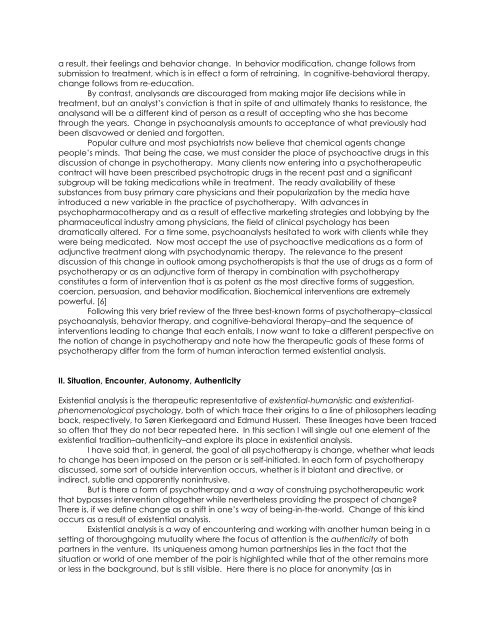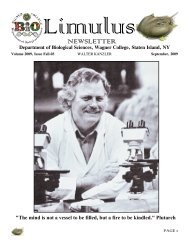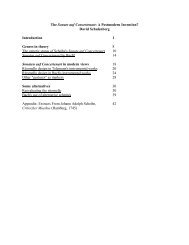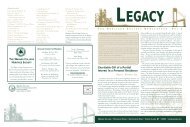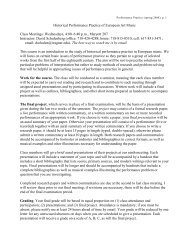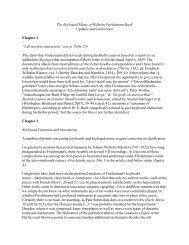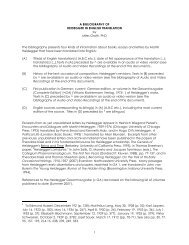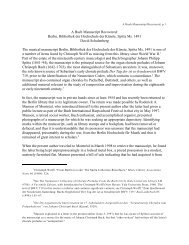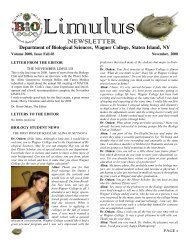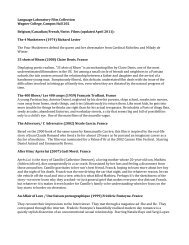SEVEN PAPERS ON EXISTENTIAL ANALYSIS ... - Wagner College
SEVEN PAPERS ON EXISTENTIAL ANALYSIS ... - Wagner College
SEVEN PAPERS ON EXISTENTIAL ANALYSIS ... - Wagner College
You also want an ePaper? Increase the reach of your titles
YUMPU automatically turns print PDFs into web optimized ePapers that Google loves.
a result, their feelings and behavior change. In behavior modification, change follows from<br />
submission to treatment, which is in effect a form of retraining. In cognitive-behavioral therapy,<br />
change follows from re-education.<br />
By contrast, analysands are discouraged from making major life decisions while in<br />
treatment, but an analyst’s conviction is that in spite of and ultimately thanks to resistance, the<br />
analysand will be a different kind of person as a result of accepting who she has become<br />
through the years. Change in psychoanalysis amounts to acceptance of what previously had<br />
been disavowed or denied and forgotten.<br />
Popular culture and most psychiatrists now believe that chemical agents change<br />
people’s minds. That being the case, we must consider the place of psychoactive drugs in this<br />
discussion of change in psychotherapy. Many clients now entering into a psychotherapeutic<br />
contract will have been prescribed psychotropic drugs in the recent past and a significant<br />
subgroup will be taking medications while in treatment. The ready availability of these<br />
substances from busy primary care physicians and their popularization by the media have<br />
introduced a new variable in the practice of psychotherapy. With advances in<br />
psychopharmacotherapy and as a result of effective marketing strategies and lobbying by the<br />
pharmaceutical industry among physicians, the field of clinical psychology has been<br />
dramatically altered. For a time some, psychoanalysts hesitated to work with clients while they<br />
were being medicated. Now most accept the use of psychoactive medications as a form of<br />
adjunctive treatment along with psychodynamic therapy. The relevance to the present<br />
discussion of this change in outlook among psychotherapists is that the use of drugs as a form of<br />
psychotherapy or as an adjunctive form of therapy in combination with psychotherapy<br />
constitutes a form of intervention that is as potent as the most directive forms of suggestion,<br />
coercion, persuasion, and behavior modification. Biochemical interventions are extremely<br />
powerful. [6]<br />
Following this very brief review of the three best-known forms of psychotherapy–classical<br />
psychoanalysis, behavior therapy, and cognitive-behavioral therapy–and the sequence of<br />
interventions leading to change that each entails, I now want to take a different perspective on<br />
the notion of change in psychotherapy and note how the therapeutic goals of these forms of<br />
psychotherapy differ from the form of human interaction termed existential analysis.<br />
II. Situation, Encounter, Autonomy, Authenticity<br />
Existential analysis is the therapeutic representative of existential-humanistic and existentialphenomenological<br />
psychology, both of which trace their origins to a line of philosophers leading<br />
back, respectively, to Søren Kierkegaard and Edmund Husserl. These lineages have been traced<br />
so often that they do not bear repeated here. In this section I will single out one element of the<br />
existential tradition–authenticity–and explore its place in existential analysis.<br />
I have said that, in general, the goal of all psychotherapy is change, whether what leads<br />
to change has been imposed on the person or is self-initiated. In each form of psychotherapy<br />
discussed, some sort of outside intervention occurs, whether is it blatant and directive, or<br />
indirect, subtle and apparently nonintrusive.<br />
But is there a form of psychotherapy and a way of construing psychotherapeutic work<br />
that bypasses intervention altogether while nevertheless providing the prospect of change?<br />
There is, if we define change as a shift in one’s way of being-in-the-world. Change of this kind<br />
occurs as a result of existential analysis.<br />
Existential analysis is a way of encountering and working with another human being in a<br />
setting of thoroughgoing mutuality where the focus of attention is the authenticity of both<br />
partners in the venture. Its uniqueness among human partnerships lies in the fact that the<br />
situation or world of one member of the pair is highlighted while that of the other remains more<br />
or less in the background, but is still visible. Here there is no place for anonymity (as in


